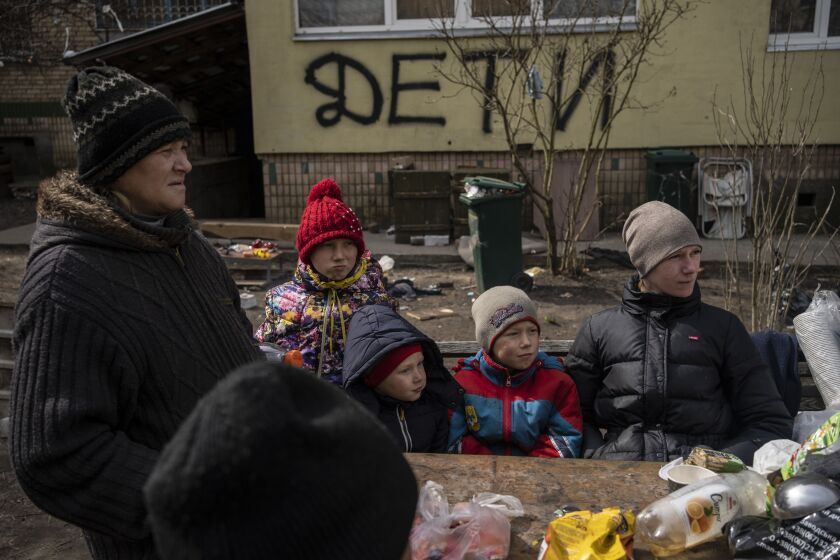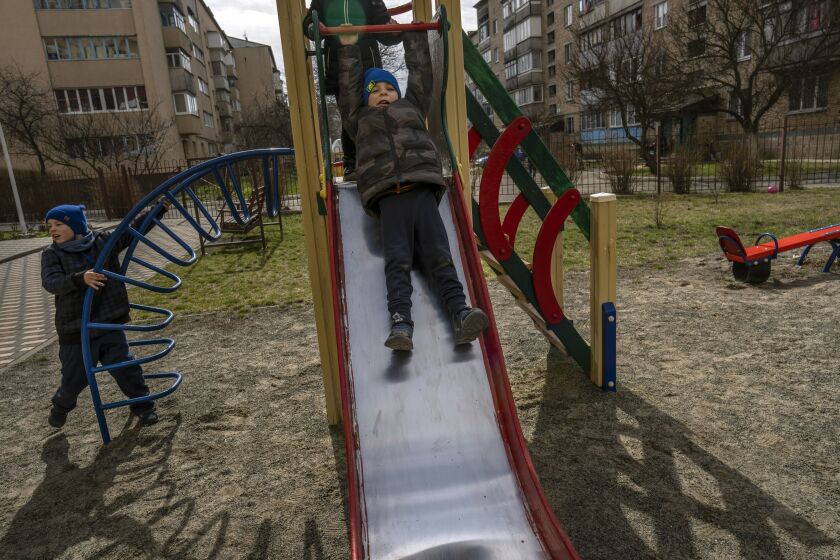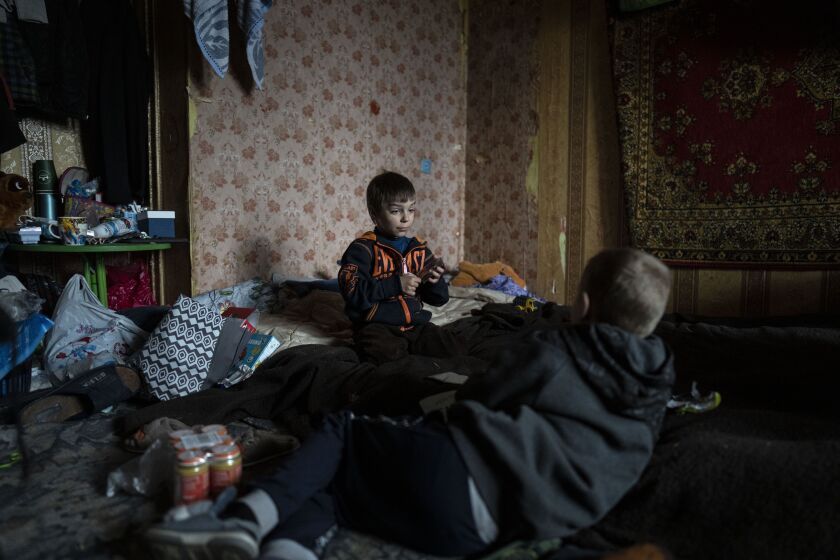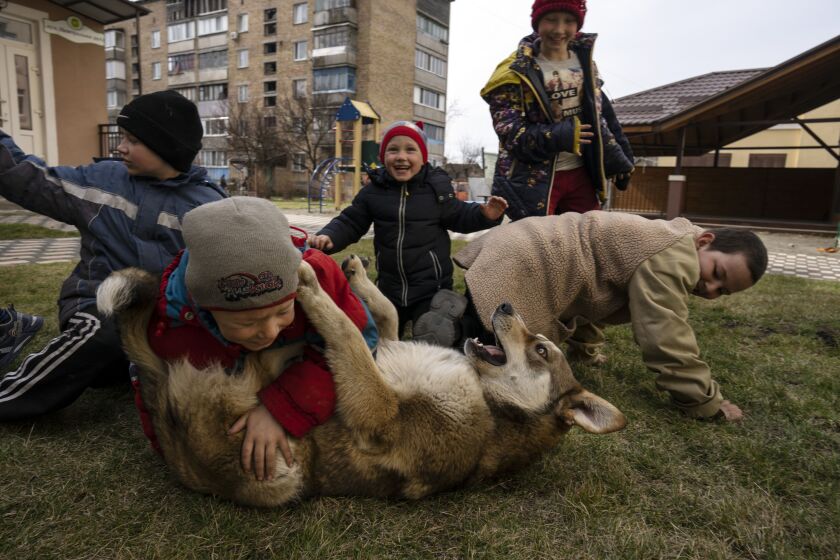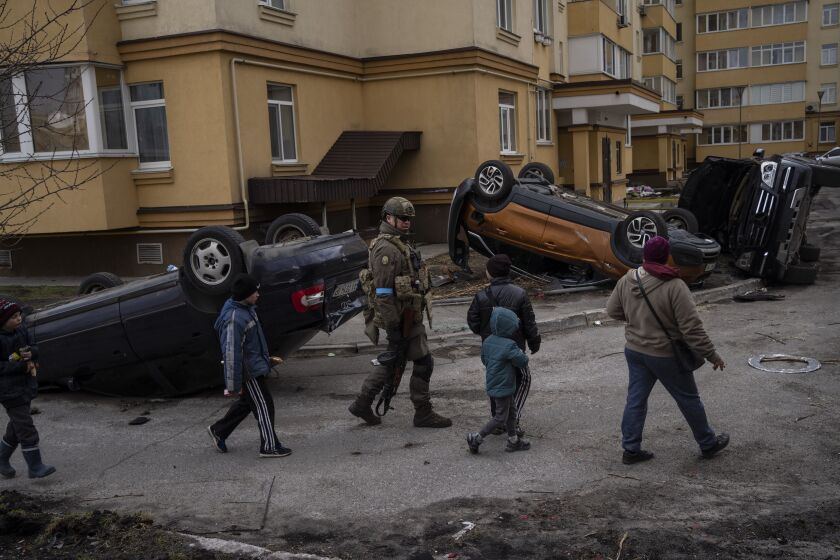In a darkened basement, under a building shaking from the bombardment of war, there were few other options.
Six-year-old Vlad watched as his mother was carried out of the shelter last month and to the yard of a nearby home. Her burial was hurried and devastating.
Now, with Russian forces having withdrawn from Bucha after a monthlong occupation, Vlad’s father Ivan Drahun dropped to his knees at the grave and touched the dirt near his wife Maryna’s feet.
“Hi, how are you?” he said during the visit. “I miss you so much. You left so soon. You didn’t even say goodbye.”
Their young son also visited the grave. He placed a juice box and two cans of baked beans on it because, with the stress of war, his mother had barely been eating.
Her family still doesn’t know what illness caused her death.
And, much like their town, they barely know how to move on.
Bucha witnessed some of the ghastliest scenes during Russia’s invasion.
And nearly no children have been seen in its silent streets since then. The many bright playgrounds in the once-popular community with good schools on a far edge of the capital city of Kyiv have remained empty.
The Russians used a children’s camp in Bucha as an execution ground.
Bloodstains and bullet holes mark a basement. On a ledge near the camp entrance, Russian soldiers placed a toy tank. It appeared to be connected to fishing wire — a possible booby trap in this most vulnerable of places.
Steps from Vlad’s home, some of the Russians used a kindergarten as a base. They left it intact while other buildings nearby suffered. Casings of used artillery shells were left along a fence in the yard.
At a playground not far from there, white and red tape marked off unexploded ordnance. And the booms of de-mining operations were so strong they set off car alarms.
At the apartment block where Vlad, his older brother Vova and sister Sophia live, someone had spray-painted “CHILDREN” in child-high letters on an outside wall. Under it, a wooden box once used for ammunition held a Teddy bear and other toys.
It’s here that Bucha’s fragile renewal can be seen.
A small group of neighborhood children were gathered here, finding distraction from the war. Bundled up in winter coats, they kicked a football, wandered around with bags of snacks handed out by visiting volunteers, called out from a glass-less window above.
Their parents, taking in the feeble warmth of spring after weeks in freezing basements, spoke about how they tried to protect the children.
“We covered his ears,” Polina Shymanska said of her 7-year-old great-grandson Nikita. “We hugged him, kissed him.”
She played chess with him, and the boy let her win.
Upstairs, in a neighbor’s apartment where Vlad’s father has merged his family, for now, with the family of a neighbor to help oversee their collection of children, Vlad curled up on a bed with another boy and played cards.
The radiator provided no heat. There was still no gas, no electricity, no running water.
It’s more painful than Vlad’s family can stand to return to their own apartment nearby. The memories of Maryna are everywhere, from her perfume bottles on the table by the front door to what’s now the quiet of her kitchen.
In the living room, time seemed to have stopped. Limp balloons dangled from the overhead light. A string of colorful flags still hung on a wall. So did a photo showing Ivan and Maryna holding Vlad on the day he was born.
On Feb. 19, they celebrated his birthday.
Five days later, the war began. And the family’s life shrank to a dank concrete half-room in the basement, lined with blankets and scattered with sweets and toys.
It was very, very cold, Druha remembers. He said he and his wife did what they could to muffle the sounds of shelling for Vlad, to try to help him stay calm.
But they were afraid, too.
Two weeks ago, Ivan took Vlad to the makeshift toilet in the shelter and visited neighbors. Then, he came to tell Maryna he was going outside.
“I touched her shoulder,” he said, “and she was cold. I realized she was gone.”
At first, he said, Vlad didn’t seem to understand what had happened. The boy said his mother had moved away.
At her burial, he watched Ivan kneel and cry.
And now he knows what death is.
Death is inseparable from Bucha. Authorities told The Associated Press that at least 16 children were among the hundreds of people killed.
Those who survived face a long recovery.
“They’ve realized that now it’s calm and quiet,” Ivan said. “But, at the same time, older children understand that it’s not the end. The war is not finished. And it’s hard to explain for the smaller ones that war is still going on.”
The children are adapting, he said. They have seen a lot. Some saw dogs killed.
Now, the war has even slipped into the games they play. In a sandbox outside the kindergarten, Vlad and a friend “bombed” each other with fistfuls of sand.
“I’m Ukraine,” one said.
“No, I’m Ukraine,” said the other.


